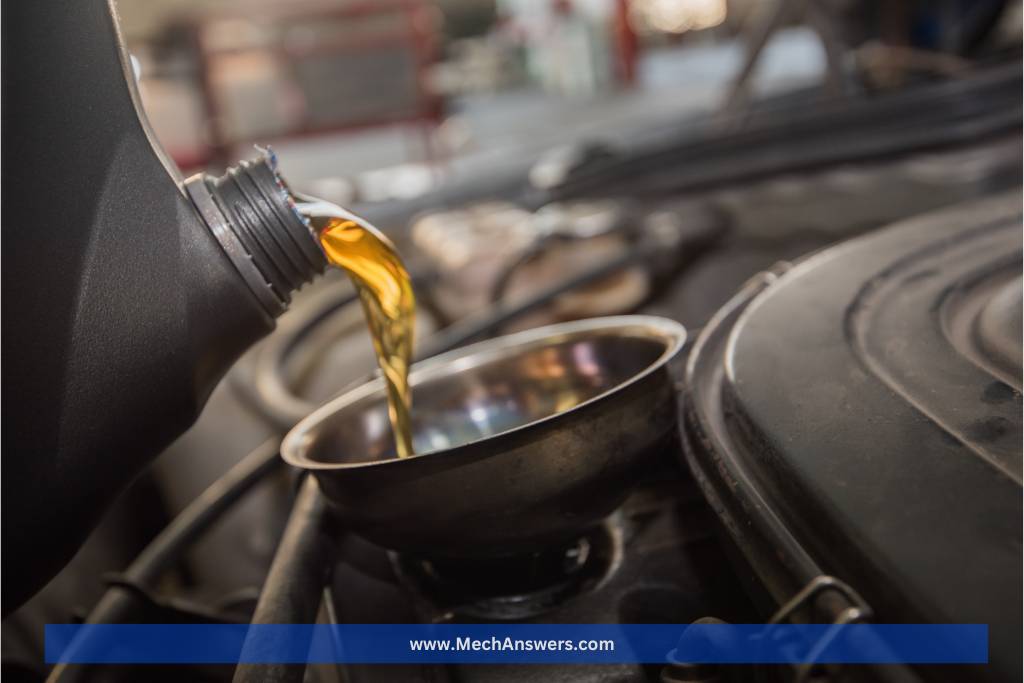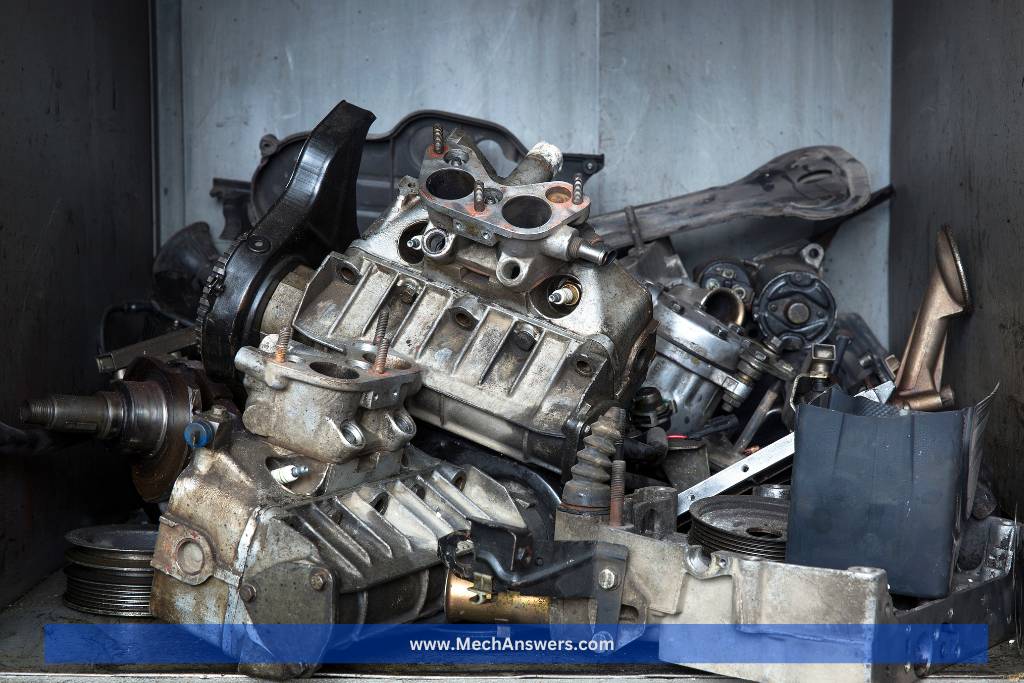At one point or another, you may have found yourself pondering, “Can I Use 10W40 Instead Of 10W30?” You’re not alone in this query, as it’s a common dilemma faced by vehicle owners. If you’ve been searching for a clear answer, your quest ends here.
So, can I use 10W40 instead of 10W30? The short answer is, yes, you can technically use 10W40 instead of 10W30. However, the difference in viscosity between the two can impact engine performance, particularly in specific temperature conditions.
This article is a must-read for those who want to fully comprehend the implications of switching between these two oil types. Knowing the potential safety risks and consequences can help guide your decision-making, ensuring your vehicle runs smoothly and efficiently.
Table of Contents
Key Differences Between 10W40 and 10W30 Motor Oils
Initial Cold Flow:
Both 10W40 and 10W30 motor oils are designed to perform optimally during cold starts, as indicated by the ’10W’ prefix.
This means that they both offer protection during those crucial first moments when the engine is cranked in cold conditions. However, what truly sets them apart is their behavior as the engine heats up.
Viscosity at Operating Temperature:
When an engine reaches its normal operating temperature, the viscosity or thickness of the oil plays a significant role in engine protection. The higher the number, the thicker the oil is at these temperatures.
In practical terms, this means that 10W40 will be thicker than 10W30 when both are subjected to the heat of a running engine.
Performance Under Extreme Conditions:
Given that 10W40 has a higher viscosity at hot temperatures, it can offer superior protection during situations that stress the engine, like towing or prolonged high-speed driving.
Conversely, 10W30, being slightly more fluid, could provide marginally improved fuel efficiency due to reduced friction between engine components. Selecting between these oils often depends on the specific driving conditions and requirements one expects their vehicle to undergo.
Fuel Efficiency and Everyday Usage:
For regular, everyday driving, many might not notice a pronounced difference between the two oils. Yet, those keen on optimizing fuel consumption might lean towards 10W30.
Its thinner consistency at high temperatures means there’s less resistance for the engine’s moving parts, which can lead to better fuel economy. Although the difference is slight, over extended periods, choosing 10W30 could result in noticeable savings.
To sum it up, while both oils have their unique advantages, it’s vital to evaluate individual driving habits, vehicle requirements, and even geographical locations to decide the best fit.
Comparison Between 10W40 and 10W30 Motor Oils
| 5W-30 | 10W-30 | 10W-40 | |
|---|---|---|---|
| Viscosity | Medium | Medium | High |
| Cold Climate | Good | Moderate | Fair |
| Hot Climate | Moderate | Moderate | Good |
| Fuel Efficiency | Good | Moderate | Fair |
| Engine Wear Protection | Good | Good | Excellent |
| High-Performance Engines | Moderate | Moderate | Good |

Can I Use 10W40 Instead of 10W30?
Understanding the Basics:
Motor oils are fundamentally designed to lubricate, protect, and enhance the performance of an engine. The numbers and letters associated with motor oils, such as 10W40 and 10W30, refer to the oil’s viscosity, which is a measure of how easily it flows.
The ‘W’ stands for winter, indicating the oil’s performance at cold temperatures. It’s paramount to select the right motor oil for your vehicle to ensure optimum performance and avoid potential damage.
The Technical Difference:
Both 10W40 and 10W30 oils are designed to work efficiently at cold starts. However, once the engine reaches its operating temperature, 10W40 will be slightly thicker than 10W30.
This thickness ensures better lubrication under high-stress conditions. But it also means that the engine might work a bit harder, potentially affecting fuel efficiency.
Considering the Vehicle’s Requirements:
Most vehicle manufacturers specify the type of oil best suited for the vehicle in the owner’s manual. Adhering to this recommendation is crucial.
Using a different oil, like substituting 10W40 for 10W30, can deviate from the optimal conditions the engine was designed for. While it might not result in immediate damage, it can accelerate wear and tear over time.
Benefits of Switching to 10W40:
In scenarios where the engine is subjected to extreme conditions, like towing heavy loads, continuous high-speed driving, or in warmer climates, a thicker oil might offer better protection. 10W40, being a bit more viscous, can provide that extra shield under these circumstances.
Potential Downsides:
On the flip side, for everyday, regular driving, especially in colder climates, using 10W40 instead of the recommended 10W30 might not be advantageous.
The thicker oil can lead to reduced fuel economy and might not circulate as quickly during cold starts as 10W30 would. Over time, consistently using a thicker oil can also lead to deposits in the engine, which can hamper its performance and longevity.
In Conclusion:
While it’s technically possible to use 10W40 instead of 10W30, whether it’s beneficial or detrimental largely depends on the specific conditions the vehicle is subjected to.
Always prioritize the manufacturer’s recommendation and consult with a mechanic when considering a switch. The right oil ensures that the engine operates seamlessly, prolonging its lifespan and ensuring reliable performance.

Risks, Safety, and Performance Implications: How Using 10W40 Instead of 10W30 Can Affect Engine Safety
Viscosity and Engine Protection:
Motor oil’s primary function is to provide lubrication to engine parts and reduce friction. The right viscosity is crucial in this role. 10W40 is thicker than 10W30 at operating temperatures, which can influence how well it coats engine components.
In some high-stress scenarios, like extreme heat or when carrying heavy loads, this extra thickness can offer better protection. However, it can also mean that the oil doesn’t flow as easily through the engine as 10W30 would.
Cold Start Implications:
While the ’10W’ suggests that both oils have similar performance at cold temperatures, there are still subtle differences. On particularly cold mornings, 10W40 might not circulate as quickly as 10W30, which can result in a momentary lack of lubrication.
This can cause increased wear on engine parts during cold starts and may contribute to premature engine wear over time.
Fuel Efficiency and Engine Load:
Engines are optimized for specific oil viscosities. When a thicker oil like 10W40 is used in an engine designed for 10W30, the engine may work harder to pump the oil, leading to reduced fuel efficiency.
Consistent use of a non-optimal viscosity can also strain the engine, potentially leading to reduced performance or even engine damage in the long run.
Oil Pressure Concerns:
Using 10W40 can lead to higher oil pressure compared to 10W30. While this might sound like a good thing, excessively high oil pressure can strain seals and gaskets, leading to potential leaks. An oil leak not only affects performance but can also pose a safety risk if the leaked oil comes in contact with hot engine parts.
The Accumulation of Deposits:
Thicker oils can sometimes result in the accumulation of deposits in the engine. Over time, these deposits can hamper the engine’s performance, leading to reduced efficiency, increased emissions, and potentially more frequent repairs.
Deposits can also disrupt oil flow, impacting the overall cooling and lubrication processes within the engine.
In Conclusion:
Switching from 10W30 to 10W40 might seem inconsequential, but the implications on engine safety and performance can be profound.
Always consult your vehicle’s manual and consider seeking advice from a mechanic before making any changes to the recommended motor oil. The right viscosity is essential for both engine longevity and optimal performance.

Benefits and Disadvantages of 10W40 Motor Oil
Benefits of 10W40
1. Excellent Performance in Hotter Climates
10W40 motor oil is known for its reliable performance under consistently high temperatures. In regions that frequently experience hotter weather, this oil retains its viscosity better, providing stable protection for engines.
2. Suitable for Older Engines
Engines with a significant number of miles or those that have seen better days may benefit from 10W40. This oil offers better-sealing properties, potentially reducing oil consumption and improving performance in worn engines.
3. Enhanced Protection during Heavy Towing
For vehicles that frequently tow heavy loads or are put under consistent heavy-duty use, 10W40 oil can provide an added layer of protection against intensified wear and tear.
Disadvantages of 10W40
1. Not Ideal for Cold Start-ups
In colder climates or during winter months, 10W40 can be thicker at startup, making engines work harder during ignition. This can lead to increased engine wear over time.
2. Fuel Efficiency Concerns
Due to its thicker consistency, vehicles using 10W40 might experience slightly reduced fuel efficiency compared to thinner motor oils.
Benefits and Disadvantages of 5W30 Motor Oil
Benefits of 5W30
1. Versatility in Various Climates
5W30 motor oil boasts a broad performance range, making it suitable for use in both cold and warm climates. Its ability to remain fluid at lower temperatures ensures swift engine startups during cold mornings.
2. Fuel Efficiency
Being a slightly thinner oil when compared to 10W40, 5W30 can improve fuel economy as it allows for smoother engine operations and less resistance.
3. Recommended for Many Modern Vehicles
Most modern car manufacturers recommend 5W30 oil for their engines, which means it’s designed to cater to the latest engine technologies and specifications.
Disadvantages of 5W30
1. Might Not Be Ideal for Older Engines
Older engines, or those with significant wear, might experience increased oil consumption when using 5W30 due to its thinner consistency.
2. Reduced Protection in Extreme Heat
In consistently high-temperature regions or under extreme heavy-duty operations, 5W30 might lose its protective properties faster than thicker oils like 10W40.
In conclusion, while both oils have their place, it’s essential to choose based on the vehicle’s age, the prevalent climate and the type of use the vehicle is subjected to. Always refer to the manufacturer’s guidelines when selecting an oil grade.
Is it Safe to Mix 10W40 and 10W30 Motor Oils?
1. Compatibility:
At their core, both 10W40 and 10W30 motor oils have similar base oils; the primary difference is in their viscosity modifiers. While mixing them won’t result in any immediate chemical reactions or complications, it will lead to a change in the overall viscosity of the resulting mixture.
2. Viscosity Impact:
If you mix 10W40 and 10W30, the resulting viscosity will sit somewhere between the two. It won’t precisely be 10W40 or 10W30, but rather something in the middle. Depending on the ratio of the mix, you might get a viscosity closer to one end or the other.
3. Short-Term Solution:
If you’re in a situation where you only have access to both and need to top up your engine oil, it’s generally safe for a short-term solution. However, it’s not advisable to make it a regular practice or a long-term fix.
What Happens If I Put 10W40 Instead of 10W30?
1. Alteration in Viscosity Performance:
10W40 is thicker at operating temperatures compared to 10W30. When you replace 10W30 with 10W40, you’re introducing a thicker oil, which might change the lubrication properties within your engine.
2. Potential Impact on Fuel Efficiency:
The engine might have to work slightly harder to pump the thicker 10W40 oil, possibly leading to reduced fuel efficiency. Over extended periods, this might impact your fuel economy.
3. Engine Wear in Cold Temperatures:
10W30 provides better performance in colder temperatures due to its ability to flow more easily. Switching to 10W40 might expose your engine to a slightly higher risk of wear during cold starts, especially in very cold climates.
4. Beneficial in High-Stress Situations:
On the flip side, in conditions where the engine is under high stress, like in extreme heat or heavy towing, 10W40 can offer better protection due to its thickness. It might be a preferable choice in situations demanding enhanced protection from the oil.
5. Oil Consumption:
Using 10W40 might reduce oil consumption as it’s less likely to burn off compared to 10W30. This can lead to longer intervals between oil changes, potentially saving money in the long run.
6. Compatibility with Engine’s Specifications:
Always refer to your vehicle’s manual. Some engines are specifically designed for certain viscosities. Using a different viscosity than recommended can potentially affect the engine’s performance and longevity.
Is 10W-30 or 40 Better for Summer?
1. Viscosity Understanding:
Viscosity essentially describes an oil’s resistance to flow. Higher-viscosity oils, like 10W-40, are thicker and flow less easily than their lower-viscosity counterparts, such as 10W-30.
2. Performance in Heat:
During summer, ambient temperatures rise, potentially causing engine oil to thin out. Thicker oils, like 10W-40, can handle heat better as they don’t thin out as quickly as thinner oils. This means that 10W-40 might provide better protection in the high-heat conditions of summer.
3. Protection from Wear:
Thicker oils create a more robust film between engine components, reducing friction and wear. Given that engines can get hotter in the summer, a thicker protective film might be advantageous.
Is 10W-40 Good for Older Engines?
1. Wear and Tear:
Older engines generally have more wear and tear, which can result in wider clearances between parts. The thicker consistency of 10W-40 can fill these gaps better than a thinner oil.
2. Reduction in Oil Consumption:
A common problem with older engines is increased oil consumption. The thicker nature of 10W-40 can help reduce the rate at which oil is burned or leaked.
3. Compatibility Check:
Though 10W-40 might offer benefits for older engines, it’s crucial to check the manufacturer’s recommendations. Some older engines might not perform optimally with thicker oils.
Does 10W40 Prevent Rust?
1. Additives in Motor Oil:
Most motor oils, including 10W-40, come with a set of additives that serve various purposes. One of these additives is designed to combat the formation of rust inside the engine.
2. Role in Moisture Management:
Engines can generate condensation and moisture, especially during cooldown periods. The anti-rust additives in 10W-40 oils ensure that this moisture doesn’t lead to rust formation on internal engine components.
3. Not a Complete Solution:
While 10W-40 does help prevent rust due to its additives, it’s essential to maintain regular oil changes. Old, contaminated oil loses its protective properties and can lead to rust and other issues over time.
10w30 vs 10w40 Oil – What’s the Difference? (Which is Better for Your Car?) >> Check out the video below:
FAQ Section
Is it safe to mix 10W40 and 10W30 motor oils?
While mixing different viscosities of motor oil is generally not recommended, doing so in an emergency or temporary situation is unlikely to cause immediate damage to your engine.
However, it is essential to use the recommended viscosity for your vehicle as soon as possible to ensure optimal engine performance and protection.
Can I use 10W40 instead of 10W30 in a cold climate?
Using a higher viscosity oil like 10W40 instead of 10W30 in cold climates may result in reduced flow at startup, which could lead to increased engine wear. It is best to follow the manufacturer’s recommendations for the appropriate oil viscosity based on the climate in which you drive.
What are the potential long-term effects of using 10W40 instead of 10W30?
Using 10W40 instead of the recommended 10W30 could potentially lead to increased engine wear, reduced fuel efficiency, and decreased overall engine performance. It is always best to follow the manufacturer’s recommendations for the appropriate oil viscosity for your vehicle.
How can I determine the right motor oil viscosity for my vehicle?
The right motor oil viscosity for your vehicle can be found in your owner’s manual. The manufacturer provides recommendations based on the specific engine type, driving conditions, and climate considerations.
Will using 10W40 instead of 10W30 void my vehicle’s warranty?
Using motor oil with a different viscosity than recommended by the manufacturer could potentially void your vehicle’s warranty, especially if engine damage can be traced back to the use of the incorrect oil. It is essential to follow the manufacturer’s recommendations to ensure the validity of your warranty.
How does engine oil viscosity affect fuel efficiency?
Engine oil viscosity can have a direct impact on fuel efficiency. Lower viscosity oils generally provide better fuel efficiency due to reduced internal friction within the engine. However, it is crucial to balance fuel efficiency with proper engine protection, so always use the manufacturer’s recommended viscosity.
Can use the wrong motor oil viscosity cause engine damage?
Using the wrong motor oil viscosity can lead to increased engine wear and potential damage due to inadequate lubrication or excessive internal friction. Always use the recommended oil viscosity for your specific vehicle to ensure optimal engine protection and performance.
How often should I change my motor oil if I use 10W40 instead of 10W30?
The frequency of oil changes should not be affected by using 10W40 instead of 10W30. However, it is crucial to follow the manufacturer’s recommended oil change intervals for your specific vehicle to ensure optimal engine protection and performance.
Are there any benefits to using 10W40 over 10W30 in certain situations?
In some cases, using 10W40 instead of 10W30 might be beneficial, such as in high-performance engines or under heavy load conditions where a higher viscosity oil can provide better protection against wear and high-temperature breakdown.
However, it is crucial to consider your vehicle’s specific requirements and consult the owner’s manual for guidance.
Is it necessary to flush the engine if I switch from 10W30 to 10W40 motor oil?
It is generally not necessary to flush the engine when switching between similar motor oil types, such as from 10W30 to 10W40.
However, if you are changing from a conventional oil to a synthetic oil or vice versa, it may be beneficial to perform a flush to ensure optimal performance and protection.
Always consult your vehicle’s owner’s manual or a professional mechanic for guidance on this process.
Are there any specific factors to consider before switching from 10W30 to 10W40 motor oil?
Yes, there are several factors to consider before switching to 10W40 motor oil. These include the age of your vehicle, the type of engine it has, the climate where you live, and the conditions under which you typically drive.
Will using 10W40 instead of 10W30 affect my vehicle’s fuel economy?
Yes, it is possible that using 10W40 instead of 10W30 may slightly reduce your vehicle’s fuel economy. This is because the thicker oil can create more resistance in the engine, which can lead to a decrease in fuel efficiency.
Is it safe to mix 10W30 and 10W40 oil?
It is generally not recommended to mix different types of motor oil, including 10W30 and 10W40. Mixing oils with different viscosities can result in unpredictable oil performance, and may cause engine damage in some cases.
If you need to add oil to your engine and do not have the same type of oil on hand, it is best to add the same type of oil that is already in your engine or consult a mechanic.
Can switching to 10W40 instead of 10W30 cause engine leaks?
It is unlikely that switching from 10W30 to 10W40 will cause engine leaks, as both types of oil have similar properties and are designed to work in modern engines.
However, if your engine already has leaks, switching to a thicker oil like 10W40 may make those leaks more noticeable. It is always important to address any existing engine leaks before switching to a different type of oil.
Related Articles
Read more >> 5W20 vs 5W30: A Detailed Comparison With Pros And Cons
Read more >> 10W30 vs 10W40: A Detailed Comparison with Pros and Cons!
Read more >> Can I Use 5W30 Instead of 5W20? Safety & Consequences
Read more >> Can I Use 10W30 Instead of 5W30? Safety & Consequences
Read more >> Can Low Oil Cause Overheating? 12 Causes & Solutions
Read more >> Why Does My Dipstick Shows No Oil After Oil Change? (Facts!)
Read more >> Can The Wrong Oil Cause Overheating? Simply Explained
Conclusion
The question of whether you can use 10W40 instead of 10W30 motor oil depends on various factors such as your vehicle’s specific requirements, driving conditions, and climate.
While it may be possible to use 10W40 in certain situations, such as high-performance engines or under heavy loads, it is essential to always follow your vehicle manufacturer’s recommendations to ensure optimal engine performance and protection.
Remember that using the wrong motor oil viscosity can potentially lead to increased engine wear, reduced fuel efficiency, and even void your vehicle’s warranty.
To make the best decision for your vehicle, consult your owner’s manual and consider factors such as climate, driving conditions, and engine type when selecting the appropriate motor oil.

